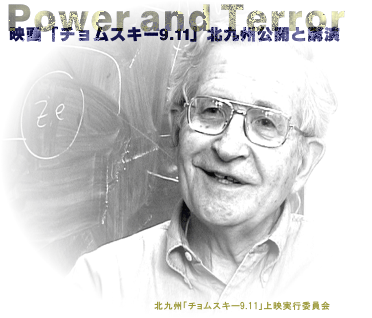
|
|

会場と日時

北九州モノレール「競馬場前」駅下車。
学内の駐車場は使用できません、近隣に競馬場の駐車場があります。
1時30分〜1時35分
挨拶・案内
1時35分〜2時45分
映画上映
3時00分〜4時00分
講演会
Time & Date
1:30 - 4:00 p.m., Saturday, April 26, 2003
Program
1:30 - 1:35
Opening Remarks
1:35 - 2:45
Film
2:45 - 3:00
Break
3:00 - 4:00
Lecture and Discussion
Venue
Auditorium A-101, Main Building,
the University of Kitakyushu
Access from Kokura Station:
Take the monorail to Keibajoo-mae Station
10-minute ride
Access from Hakata Station:
Take JR Kagoshima line to Kokura Station
Access from Tenjin area:
Take Nishitetsu highway bus Nakatani line to Keibajoo-mae/ Kitakyushu-shiritsu-daigaku-mae stop
*No parking space available on campus. An adjacent parking lot for JRA Kokura Race Course is open to the public and is in operation until 5:30 p.m.
|
上映および講演のための資料代
500円
Material Fee
\500 (Donations are welcome.)
託児サービス
お子様づれの方のために学内で託児サービスをいたします
映画「チョムスキー9.11」とは
今年74歳になるノーム・チョムスキーは、現在もマサチューセッツ工科大学教授として研究を続ける言語学者。言語学の世界に革命をもたらし、京都賞を受賞するなど世界中でその業績が高く評価されている。一方で、ベトナム戦争以来、アメリカの外交政策を批判する活動を一貫して続けており、特に昨年の9月11日におきた同時多発テロ以降、彼の事実に基づいた鋭い政治評論と発言は、アメリカ内外で高い注目を集めている。
ロックバンドU2のボーカル、ボーノが「飽くなき反抗者」と呼ぶ反骨の知識人、ノーム・チョムスキー。本作は、アメリカにおけるもっとも重要な「アメリカ批判者」であるチョムスキーの最新のインタヴューとその活動の記録である。
監督は、画家の丸木位里・丸木俊夫妻を描いた『劫火・ヒロシマからの旅』でアカデミー賞ドキュメンタリー部門にノミネートされたジャン・ユンカーマン。与那国でカジキと闘う82歳の老漁師を描いた『老人と海』で東京の劇場動員記録を塗り替え、日本庭園についてのドキュメンタリー「夢窓・庭との語らい」ではアメリカ・エミー賞を受賞した、ユンカーマン監督の待望の最新作である。
|
About the film
|
Noam Chomsky, who will turn 74 in December, is a linguist and Institute Professor at Massachusetts Institute of Technology. He is the pioneer of the theory of generative grammar, which has brought about a paradigm shift in the field of linguistics, and has received many academic awards, including the Kyoto Prize. While accumulating distinguished achievements in academia, he has also been a steadfast critic of U.S. foreign policy ever since the Vietnam War. In particular, his acute political essays and comments have attracted wide attention in and out of the United States in the aftermath of the terrorist attacks of September 11, 2001.
Labeled as the "rebel without a pause" by Bono, lead singer of the band U2, he is an anti-establishment activist intellectual. The film compellingly portrays Chomsky as the most important voice of dissent in the United States today.
The film is directed by John Junkerman, who was nominated for the documentary feature category of the Academy Awards for his “Gooka: Hiroshima-kara-no Tabi (Hellfire: A Journey from Hiroshima)” depicting the painters Iri and Toshio Maruki. He has also directed “Roojin-to Umi (The Old Man and the Sea),” in which an 82-year-old fisherman’s attempt to capture a marlin is portrayed. The movie broke Tokyo box-office records. He also won an Emmy Award for documentary films with his “Musoo: Niwa-to-no Katarai (Musoo: Conversation with Gardens)” on Japanese gardens.
|
北九州「チョムスキー9.11」上映実行委員会
(五十音順)
井口壽乃
(北九州市立大学文学部・助教授・メディア論)
稲月 正
(北九州市立大学外国語学部・教授・社会学)
伊野憲治
(北九州市立大学法学部・教授・ミャンマー地域研究)
漆原朗子
(北九州市立大学文学部・助教授・言語学)
門屋裕和
(九州フィールドワーク研究会)
上脇博之
(北九州市立大学法学部・教授・憲法学)
木下靖子
(北九州市立大学・大学院生)
黒岩俊哉
(九州産業大学芸術学部・助教授・映像学)
児玉弥生
(北九州市立大学文学部・助教授・教育学)
佐藤信之
(古書店・あなもん)
新村昭雄
(北九州市立大学文学部・教授・アメリカ文学)
竹川大介
(北九州市立大学文学部・助教授・人類学)
田村慶子
(北九州市立大学法学部・教授・国際関係論)
藤井義昭
(あきみず書房)
Michael Penn
(北九州市立大学法学部・外国人教師・西アジア史)
前田譲治
(北九州市立大学文学部・助教授・アメリカ文学)
松石大介
(クラブハウス・メガヘルツ)
松本常彦
(北九州市立大学文学部・助教授・日本文学)
三満田巧
(北九州市立大学・大学院生)
Chomsky 9.11 in Kitakyushu Organization Committee
(Alphabetical order)
Yoshiaki FUJII
President, Akimizu Publishing Company
Toshino IGUCHI (Art, Media and Communication)
Associate Professor, Faculty of Humanities, the University of Kitakyushu
Tadashi INAZUKI (Sociology)
Professor, Faculty of Foreign Studies, the University of Kitakyushu
Kenji INO (Myanmar Studies)
Professor, Faculty of Law, the University of Kitakyushu
Hirokazu KADOYA,
Undergraduate student, the University of Kitakyushu
Hiroyuki KAMIWAKI (Constitution)
Professor, Faculty of Humanities, the University of Kitakyushu
Yasuko KINOSHITA,
Graduate student, The University of Kitakyushu
Yayoi KODAMA (Education)
Associate Professor, Faculty of Humanities, the University of Kitakyushu
Shunya KUROIWA(Film Art)
Associate Professor, Faulty of Art, Kyushu Sangyoo University
Joji MAEDA (American Literature)
Associate Professor, Faculty of Humanities, the University of Kitakyushu
Daisuke MATSUISHI
Manager, Clubhouse Megahertz
Tsunehiko MATSUMOTO (Japanese Literature)
Associate Professor, Faculty of Humanities, the University of Kitakyushu
Kou MIMANDA
Graduate student, the University of Kitakyushu
Michael PENN (West Asian History)
Foreign Lecturer, Faculty of Law, the University of Kitakyushu
Nobuyuki SATO
President, Anamon, second-hand bookshop
Akio SHINMURA (American Literature)
Professor, Faculty of Humanities, the University of Kitakyushu
Daisuke TAKEKAWA (Anthropology)
Associate Professor, Faculty of Humanities, the University of Kitakyushu
Keiko TAMURA (International Relations)
Professor, Faculty of Humanities, the University of Kitakyushu
Saeko URUSHIBARA (Linguistics)
Associate Professor, Faculty of Humanities, the University of Kitakyushu
協賛
日本映像学会西部支部
Cosponsor
The West Japan Chapter, the Japan Society of Image Arts and Sciences
後援
北九州市立大学
(株)西日本リビング
Support
University of Kitakyushu
Nishinippon Living Newspaper Co., Ltd
上映協力
飯山ムービープロ

事務局・連絡先
北九州市小倉南区北方4丁目2−1
北九州市立大学文学部
竹川大介
Send Mail
TEL/FAX 093−964−4167
古本屋「あなもん」
TEL/FAX 093−653−3882
Contact
Daisuke Takekawa
Faculty of Humanities, University of Kitakyushu
4-2-1 Kitagata, Kokura-minami-ku, Kitakyushu 802-8577
Phone. & Fax. (093)964-4167
Send Mail
Anamon, second-hand bookshop
Phone. & Fax. (093)653-3882
|
 準備の様子
準備の様子 当日の様子
当日の様子

 上映の趣旨
上映の趣旨











 チョムスキーはなにを語るのか?
チョムスキーはなにを語るのか?
 なぜ大学で上映するのか
なぜ大学で上映するのか
 映画を通して考えたいこと
映画を通して考えたいこと
